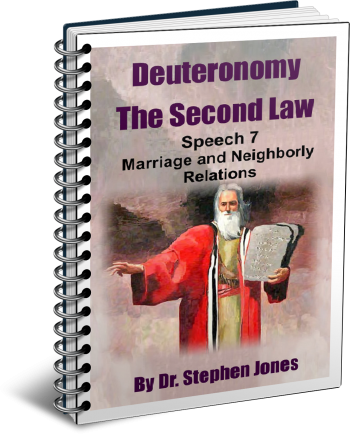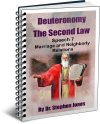Latest Posts
View the latest posts in an easy-to-read list format, with filtering options.

A commentary on the seventh speech of Moses in Deuteronomy 24-26. The book of Deuteronomy is a series of 12 speeches that Moses gave just before his death at the end of Israel's wilderness journey.
Category - Bible Commentaries

In Deut. 24:5 Moses sets forth a law that gives us a startling insight into the mind of God.
5 When a man takes a new wife, he shall not go out with the army, nor be charged with any duty; he shall be free at home one year and shall give happiness to his wife whom he has taken.
For thousands of years God’s law has endured the reputation of stern austerity to those who do not truly know the mind of God. Men have even claimed that the Old Testament Lawgiver was a very different God from Jesus. In fact, I have heard it said that Jesus has saved us from the Old Testament God. Love has found a way to conquer the meanness of God, they say.
Such people do not understand that Jesus Christ is the One who gave the law to Moses. The problem was not the law, but men’s understanding of the law. Hebrew culture, wherein women were often treated as bondservants, was based upon their misunderstanding of the law, the covenants, and the mind of God.
The law in verse 5 above is a happy law that one would expect from Jesus Christ, but seems out of place in Moses’ discourse. Jesus’ concern for women in the gospels is consistent with this law, but it seems to be at odds with most men’s view of Moses. It is difficult to grasp how this law could come out of Middle Eastern culture, where women are normally treated as servants who were created to serve their husbands. (Paul equates the Old Jerusalem with Hagar, the bondwoman in Gal. 4:25.)
This law seems totally incongruous in the light of Old Testament culture. Could such a culture have produced such a law as this without inspiration from above? Does this not suggest a heavenly origin of the law? Who else would command that men devote the first year of marriage to making their wives happy?
Men are notoriously ignorant of the little things that make women happy. I recall that when my wife and I were first married, it took me about a year for my wife to teach me the things that would make her happy. (Perhaps her reluctance to criticize is why it took so long. I often had to pull it out of her!)
It takes less than a month to form a habit. A year is more than enough to establish a life-long pattern for a happy marriage.
This law forbids a man to engage in military service for the first year of his marriage. In fact, even before the wedding itself, a man who was engaged to be married was to refrain from combat. Among the military laws of Scripture, we find this in Deut. 20:7,
7 And who is the man that is engaged to a woman and has not married her? Let him depart and return to his house, lest he die in the battle and another man marry her.
In light of these things, it is apparent that God considered the family to be of utmost importance. In fact, the law in Deut. 20:5 should be seen in this light as well:
5 The officers also shall speak to the people, saying, “Who is the man that has built a new house and has not dedicated it? Let him depart and return to his house, lest he die in the battle and another man dedicate it.”
The Hebrew word for “house” is beth, which also means “household.” This extended meaning adds richness to the meaning of this military law, for in it we see that God is not only concerned with dedicating a dead building, but also in establishing a live household. This is brought out clearly in the honeymoon law.
From a prophetic standpoint, this also overlays with the Sabbath millennium, which can be seen as a thousand-year honeymoon. In conjunction with the coming of Christ, we read in Rev. 19:7-9,
7 Let us rejoice and be glad and give the glory to Him, for the marriage of the Lamb has come and His bride has made herself ready. 8 And it was given to her to clothe herself in fine linen, bright and clean; for the fine linen is the righteous acts of the saints. 9 And he said to me, “Write, ‘Blessed are those who are invited to the marriage supper of the Lamb’.” And he said to me, “These are the true words of God.”
Virtually all prophecy has application on two levels: personal and historical. The personal application is fulfilled within our hearts on a daily, experiential basis. The historical is fulfilled through time, often over many generations. The historical fulfillment links to the personal application as men seek to know the divine plan for their own generation and then dedicate their lives to the furtherance of that plan.
The passage above (Rev. 19), when viewed historically, prophesies of the Kingdom itself, which has progressed over time to the point where the overcomers as a group are ready for the marriage.
There are two marriage patterns to consider, one under Moses and the other under Christ. Moses officiated in a marriage ceremony between God and Israel. The betrothal actually occurred through Abraham, when God promised to bless and protect his descendants. The betrothal time was 430 years (Gal. 3:17).
In the New Testament, Jesus was the Mediator of the New (marriage) Covenant, even as Moses mediated the Old (marriage) Covenant. The difference is that Moses came to Israel only once, while Jesus comes twice.
Christ’s first coming is pictured as the betrothal, followed by the wedding at his second coming. For this reason, the Ten Virgins were awaiting the coming of the Bridegroom in Matt. 25:1-13. Likewise, John tells us in Rev. 19:7, after the fall of Babylon, that “the marriage of the Lamb has come, and His bride has made herself ready.”
A betrothal is nearly as binding as the marriage itself, and a betrothed woman is already said to be the “wife” of her future husband. However, the marriage is not consummated until after the actual wedding has taken place.
On the day of Pentecost in Acts 2, Jesus sent the Holy Spirit as a dowry in this betrothal. Preparations then began for the actual wedding (on a historic level), which was to take place in the future. The dowry was customarily fifty shekels of silver, and so Pentecost means the fiftieth day. This dowry sealed the terms and set the date for the future union of Husband and wife. Though we do not know the year of this wedding, we know that it is prophesied to occur in conjunction with the second coming of Christ during the feast of Tabernacles.
The Age of Pentecost, then, is the time that the bride has been given to make herself ready for the wedding. Each individual believer throughout the Pentecostal Age is charged with the task of obtaining the wedding dress made of “fine linen, bright and clean; for the fine linen is the righteous acts of the saints” (Rev. 19:8). The parable of the Ten Virgins also shows us that we ought to have sufficient oil to burn in our lamps. That oil is the Holy Spirit, who leads us and guides us into all truth (John 16:13). Psalm 119:105 says,
105 Thy word is a lamp to my feet, and a light in my path.
Lamps are of little use apart from the oil in them. Psalm 119 equates this lamp to the word, by which the Holy Spirit leads us. The word without the Spirit is of little value, but when the Holy Spirit speaks through the word, it gives light to our path. Thus, the oil represents not only the Holy Spirit, but also the practical help that the Holy Spirit does in leading us in the path of life.
The historic fulfillment of this wedding occurs at the end of the Pentecostal Age, at a time established by the Father. The fulfillment of Tabernacles will join the Head with the Body—that portion of the Body which is ready for New Covenant marriage. This will be a limited group of people, for Revelation 20 tells us that only a portion of the body will be raised in the first resurrection. See my book, The Purpose of Resurrection.
Rev. 20:6 says, “they will be priests of God and of Christ and will reign with Him for a thousand years.” This is the time in which the Stone Kingdom of Daniel 2:35 will grow until it fills the earth. It is the time when Christ builds his new house, or household. Hence, it will be a time of peace, when “nation will not lift up sword against nation” (Isaiah 2:4). This time of peace is prophesied by the Honeymoon Laws in Deut. 20:5 and in 24:5.
This thousand-year period is based primarily on the six-day pattern of creation in Genesis 1, followed by a day of God’s rest. This concept was part of the Hebrew thought patterns in the first century, as we see from the early church writing, Epistle of Barnabas XIII, iv-vi,
4 Consider, my children, what that signifies, “He finished them in six days.” The meaning of it is this, that in six thousand years the Lord God will bring all things to an end. 5 For with Him one day is a thousand years; as Himself testifieth, saying, “Behold this day shall be as a thousand years.” Therefore, children, in six days, that is, in six thousand years, shall things be accomplished. 6 … then he shall gloriously rest in that seventh day.
Some dispute Barnabas’ view on the grounds that the Greek word chilia, “thousand,” is plural. The Greek language requires the plural to be used, because it considers a thousand to be plural. In other words, it is more than one year. The word chilia is an adjective that describes the noun “years,” and so by the Greek rules of grammar, it must be written as a plural when used with a plural noun. Barnabas thus uses grammar correctly, as does John in the book of Revelation.
The modern translators all know this, and so they have translated it correctly as “a thousand years.” The pattern of creation, then, shows us (as Barnabas testifies) that there is to come a Sabbath Rest, a millennium of rest for the earth, wherein the hard labor under the Babylonian governments of men will be replaced by the Sabbath rest of the Kingdom of God.
Further, this will also be the time when the feast of Tabernacles is fulfilled and Christ is able to marry a body of overcomers who are ready for His appearing. The law then prophesies a one-year honeymoon, which overlays upon the prophecy of the coming Sabbath millennium.
The law is prophetic, because it reveals the mind of God, by which He has created and by which He sustains His creation. Throughout history, God works out His plan according to His will as revealed in the word. And so it has pleased Him to establish a one-year honeymoon for new families, but a thousand-year honeymoon in the historical fulfillment of the creation plan.